"When A Child Throws Down A Toy" (Visage, 1980)
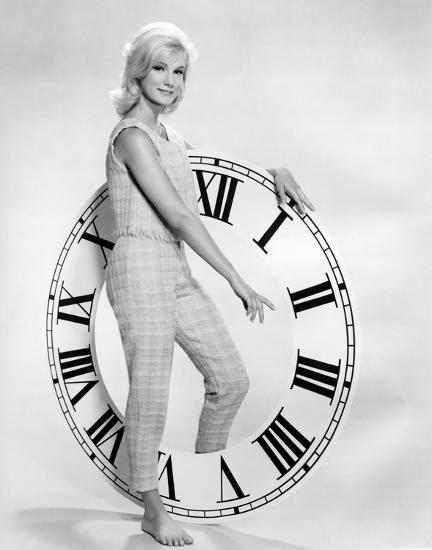
Yvette Mimieux died this past January, a mere ten days after her eightieth birthday. Among other no doubt far more important accomplishments she was also probably my first film crush from her work in the sci-fi classic "The Time Machine" (1960) in which she played Weena, the innocent, trusting girl from the distant future. This was in fact her first major role and it established her persona for the next decade. Yvette was not just beautiful, she was ethereal; slim, delicate features, silken blonde hair and soulful eyes. It was her eyes that really defined her. She had a look that was not piercing but searching, as if always trying to read the men around her. She also had a light, slightly distant voice to match her willowy frame and airy step, both of which were courtesy of her ballet dancing training. Her fey quality was quite different from the reigning blonde sex symbols of the day or earlier like Marylin Monroe, Jayne Mansfield, Brigitte Bardot, Betty Grable or Jean Harlow; playful, buxom sex kittens. Yvette presaged a change to a more adolescent but also less cartoonish fantasy girl of the sixties like Jane Fonda, Jean Seaberg and Mia Farrow.
In fact the actress she most resembled was the slightly older (born 1934) Swedish born American Inger Stevens. She was also a slim, statuesque blonde with doll-like features and pensive eyes who started as a dancer but unlike Yvette, Inger had trouble finding a defining role. She was in a successful but now forgotten sitcom named "A Farmer's Daughter" (1963-66) and even starred on Broadway (she had originally run away from home to be a dancer) but the roles she is remembered for were not the comedies or musicals she most enjoyed but as tragic or doomed women. In two classic episodes of "The Twilight Zone"; one in which she plays a lone driver going across the country who keeps meeting Mr Death again and again and another in which she plays a girl who fears she might be a robot. She also appeared in a couple episodes of "Alfred Hitchcock Presents" and the Clint Eastwood western "Hang Em High" (1968). It was ironically fitting that the roles that would define her as a tragic figure as she would die by suicide in 1972 aged 35. Yvette Mimieux, in spite of the naive, fragile dememor she would have at the start of her career would turn out to be made of sterner stuff, not only than poor cursed Inger but most of her sister early sixties sex symbols save Jane Fonda.
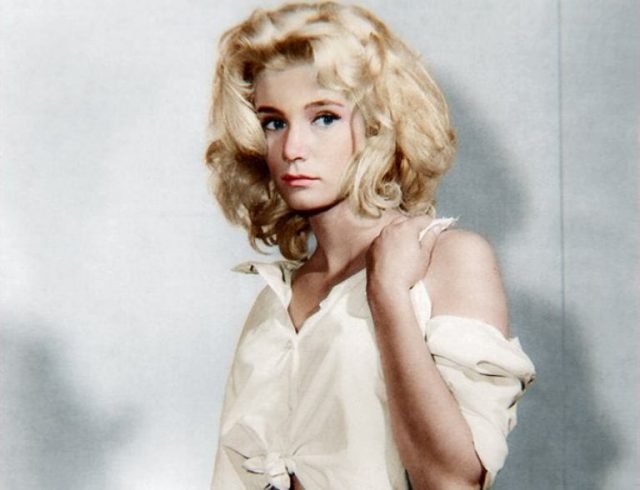
Yvette got her first small speaking role in a now forgotten 1959 TV western "Yancy Derringer" as one of two thieving sisters but her first significant role was in another, and better TV series.
"ONE STEP BEYOND"(1960);
"One Step Beyond" was one of the mystery/supernatural anthology series of the same era as "The Twilight Zone", "Alfred Hitchcock Presents" and "The Outer Limits" running from 1959 to 1961 with the gimmick being that all the stories shown were supposedly taken from the "true, documented human record". Like "Twilight Zone" and "Hitchcock Pres", "One Step Beyond" had a host who introduced and closed out each show, in this case actor John Newland who had a bland, wide-eyed, vaguely apprehensive manner. Unlike the other mentioned shows "One Step Beyond" was uneven in quality with notably smaller budget and scripts that varied in quality with some being rather slow moving and talkey. Yvette's episode however has some genuinely spooky moments in which she plays the girlfriend of an older, possessive man who kills her in a jealous rage and is then stalked by a creepy clown who had befriended her. This time Yvette gets some real screen time in which she showed her basic beautifully fey ingenue persona which would be her image for the next decade.
Aside from these TV roles she got her start in a big way with the end of the fifties in 1960 with "Platinum High School". In spite of it's name and starring Mickey Rooney and Conway Twitty this was not a frothy bobby sox rock & roll teen film but was actually a darker edged crime story.
"Platimum High School" (1960);
Directed by
CAST:
Mickey Rooney ~ Steven Conway
Dan Dureya ~ Maj Redfern Kelly
Terry Moore ~ Jennifer Evans
Yvette Mimieux ~ Lorinda Nibley
Elisha Cook Jr ~ Harry Nesbit
Conway Twitty ~ Billy Jack Barnes
Richard Jeackel ~ Hack Harlow
Jimmy Boyd ~ Bud Starkweather
Harold Lloyd Jr ~ Charlie Boy Cable
The plot (spoiler alert) is a slow boil in which a man (Mickey Rooney) comes to a small island which houses a military school in order to investigate the death of his estranged son. At every step he is met by evasion, cover-ups and veiled threats from the school's staff and students including the Commander (Dan Duryea) and his secretary/mistress (Terry Moore). Eventually it is learned that his son died in a hazing and that Duryea has been concealing this while continuing to cash tuition cheques. After a couple attempts on Rooney's life there is a fight in a cafe after which Rooney attempts to escape the island in a small boat through shark infested water with Moore who betrays Rooney as Duryea tries to kill him by running him down in the camp's much larger boat. In the end Moore is eaten by sharks while Rooney is able to blow up Duryea's boat.
The plot unfolds quite slowly and while the viewer always is suspecting things are amiss on the island and the school staff are concealing something, we don't learn what until quite late. This might almost be a film noir if it were filmed as such but most of the film is shot not in shadows and seedy locales but in the blazing sun on a pleasant island. No doubt the filmmakers intended to contrast the island's sunny vacation feel with the darker secrets it conceals but it would have been better if it were shot with a greater sense of dark atmosphere. Mickey Rooney is an odd choice to play an amateur detective, it's not that he is a bad actor but it's hard to overlook that we are clearly watching Mickey Rooney in a bar fight with three larger, younger soldiers. Again the intent was likely to show the contrast of Rooney's "aww shucks" persona in a crime film much as Fred McMurray had done in "Double Indemnity" but this is clearly an inferior but not bad film. The plot, when it finally gets to its destination, makes little sense. Hazing deaths are not uncommon but the way the Commander chooses to cover it up is both unnecessary and counter-productive, with trying to pocket the tuition checks actually making an investigation and getting caught a huge risk for little real benefit. The climactic boat chase is frankly silly and poorly shot in a way that shows the film's low budget.
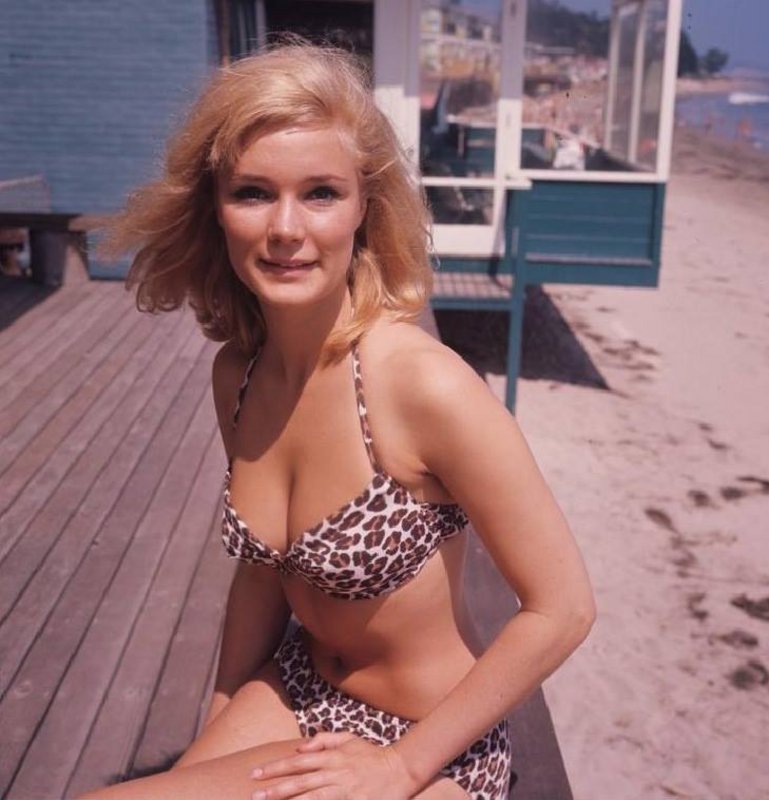
An additional trivia note about this film; besides it's misleading title, which implies a teen exploitation film which it certainly is not, the cast actually does have not one but three teen idol singers as various juvenile delinquents (in spite of their clearly being past their teens). Conway Twitty (1933-1993) was at this time an up and coming Rockabilly singer with a couple hits to his name although he would later become one of the biggest selling Country crooners of the late sixties and seventies. Jimmy Boyd (1939-2009) was a former child actor and singer who had scored a huge Christmas hit with a novelty song "All I Want For Christmas Is My Two Front Teeth" which would be a seasonal radio staple for the next twenty years. He never did score another hit although he did manage to marry TV's Batgirl, Yvonne Craig. Harold Lloyd Jr, (1931-1971) son of the iconic silent film comic, had pursued a career singing pop ballads with limited success becoming more known for his scandalous personal life. Although the film has a surplus of pop singers none of them actually sing although one of Twitty's songs can be heard playing on a radio. Terry Moore, playing the scheming secretary, had been around since the 1940's including appearing in the 1948 King Kong rip-off "Mighty Joe Young" and is at the time of this writing still alive being the last surviving cast member.
Yvette plays a secondary role as the pretty young daughter of the owner of a local hotel and one of the few people not part of the cover up who gives Rooney some assistance. As such she is given little to do but be beautiful and innocent and look stunning in a bathing suit which she does very well. Well enough in fact that she was nominated for a Golden Globe for "Best New Actress" and this no doubt soon got her cast in the film that would become her most iconic; George Pal's big budget technicolor adaptation of HG Wells "The Time Machine".
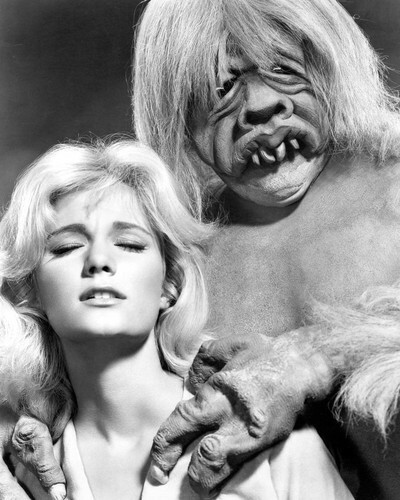
"Time Machine" (1960) was one of a number of full colour of Sci-Fi and adventure films based on the Victorian masters including Jules Verne's "2000 Leagues Under The Sea" (1954 Walt Disney w/James Mason, Kirk Douglas and Peter Lorre), Around The World In 80 Days" (1956 w/David Niven and Shirley McLain), "Micheal Strogoff" (1956 w/Curt Jurgens), "A Trip To The Moon" (1958 w/Joseph Cotton, George Sanders & Debra Paget), "Journey To The Center Of The Earth" (1959 w/James Mason again), "Mysterious Island" (1961 with F/X by Ray Harryhousen), "Master Of The World" (1961 w/Vincent Price & Charles Bronson), "In Search Of The Castaways" (1962 w/Haley Mills), "Five Weeks In A Balloon" (1962 w/Red Buttons & Peter Lorre again), and Rider Haggard's "King Solomon's Mines" (1950 w/Stewart Granger & Deborah Kerr) and "She" (1965 w/Ursula Andress). These films had big budgets with glorious colours, fine sets, the best in current special effects, breezy storylines and plenty of action suitable for adults and kids. Two previous successful HG Wells adaptations, "Things To Come" (1936 w/Raymond Massey) and "The Invisible Man" (1933 w/Claude Rains & Gloria Stuart) had already been made as black & white films.
"THE TIME MACHINE" (1960, trailer);
"The Time Machine", directed by George Pal and starring Rod Taylor, was one of the best of these films justly remembered for it's classic time travelling sequence using sped up footage, the iconic steampunk time machine chair and the ghastly Morlocks. Also remembered was the fragile, other-worldly beauty of Yvette as the childlike tragic Weena. She was beautiful in black and white but in technicolor she was luminous and timeless in a way few other actresses are. Unlike the blonde bombshells of the fifties Yvette has a natural look with her perfect skin seeming to need none of bold makeup, lipstick and eyeliner of the cheesecake era which would come to a close in the more natural sixties. The drawback for her is that the childlike Weena is a completely passive character and while that is not her fault that the character was written that way her dreamy ingenue persona would later feel like a trap. It would however establish her for the rest of the decade including her other two iconic roles of the sixties "Where The Boys Are" (1960) and "Toys In The Attic" (1963).
"WHERE THE BOYS ARE" (1960 Trailer);
"Where The Boys Are" is, at least on the surface, a typical teen comedy/musical about a group of four girlfriends (Paula Prentiss, Dolores Hart, Connie Francis and Yvette) who head down to Ft Lauderdale for Spring Break where they party and meet up with various boys (George Hamilton, Jim Hutton, Rory Harrity & Frank Gorshin). Thus far the plot seems pretty conventional; rebellious, pretty but basically wholesome boy-happy co-eds, girl-crazy but basically wholesome guys, pool parties, beach parties, light intoxication, flirting, some Cool Jazz, a Connie Francis ballad. However while the film's marketing implies "Beach Blanket Bingo" frolics the audience is not teeny boppers but the college set. Aside from the syrupy Connie Francis ballad the music is mostly the sort of West Coast Cool Jazz popular on university campuses rather than Rock & Roll. The girls are not just shallow beach bunnies. They have serious discussions about sex and relationships, think about their futures and support each other. Things take a much darker turn when Yvette's Melanie is first used and dumped by her sleazy boyfriend who then sets her up to to be raped and left wandering glassy eyed down the highway to be run down in a harrowing scene that definately would not have been seen in "Gidget". In the downbeat but satisfying ending Melanie is rescued by her friends, Paula Prentis dumps her flakey boyfriend, Dolores Hart and her new beau agree to stay together but take things slowly and the girls return to university to continue their studies. The film's theme of relatively frank (but not explicit) and mature talk about sex and female empowerment and a solid cast along with a hit single in the title song made it a success and has maintained an audience with Danny Peary including it in volume three of his "Cult Movies" series of books (1988). Note Dolores Hart, the leader of the girls would within a few years shock Hollywood and walk away from her career and enter a convent where she resides to this day. In more tragic shock mirroring an episode in the film Connie Francis, who would focus on her singing career, was herself the victim of a violent rape in the 1970's.
"TOYS IN THE ATTIC" (1963);
Directed by George Roy Hill
CAST;
Dean Martin ~ Julian Berniers
Yvette Mimiuex ~ Lily Prine-Berniers
Geraldine Page ~ Carrie Berniers
Wendy Hiller ~ Anna Berniers
Gene Tierney ~ Alberta Prine
Nan Martin ~ Charlotte Watkins
Larry Gates ~ Cyrus Watkins
Henry Simpson ~ Frank Silvera
PLOT (spoiler alert);
Dean Martin stars as Julian Berniers, a Southern wastrel returning to New Orleans with his naive teen bride, Lily (Yvette) and his two possessive spinster sisters; the romantic Carrie (Geraldine Page) and the older, plainer and more responsible Anna (Wendy Hiller). Julian is a flashy, fast talking charmer who has been engaged in various unsuccessful get-rich-quick schemes who returns home with yet another deal to soak money out of a local businessman, Cyrus, with ties to illegal activities who wants property Julian has title to. He has returned with his new bride, the young girlish Lily who loves him but is bored and jealous, suspecting that Julian is having an affair with an unknown woman who she has seen him with. The woman in question, Charlotte (Nan Martin) is indeed a former lover of Julian's now married Cyrus who Julian is attempting to make a deal with but they are not currently having an affair, instead she is trying to escape her violently possessive husband. Julian has promised to help her by giving her money using some of the money he is trying to get out of Cyrus.
These machinations are further complicated by the relationship between Julian and his sisters. They are several years older and are spinsters living alone in an old mansion where they have built their lives around taking care of their handsome, charming but irresponsible brother. Carrie in particular has become quite possessive of him while Anna is becoming concerned about Julian's sudden unexplained wealth and his wasteful spending and by Carrie's increasingly irrational behavior. For her part Carrie does not mind the idea of Julian's business scheme crashing and even welcomes it as that would force him to move back home with them. Julian's new bride Lily came from a wealthy family and it is assumed by most of the characters they he married her in part for her money. This suspicion is held at least partly by Lily and her mother Alberta Prine (Gene Tierney. The sisters, especially Carrie, further resent Alberta for her wealth, social connections and liberal ideas including about race, it is also implied that she is having an affair with her mixed race chauffeur Henry. Julian, who has been lavishing the sisters with gifts including paying off the mortgage on the mansion, gets them fired from their jobs and pays to send them off on an extended European vacation. Eventually Carrie, who has learned about the details of Julian's plan to help Charlotte escape, attempts to sabotage his plans as well as his marriage by manipulating the trusting Lily into calling Cyrus and revealing the plans of Julian and Charlotte. Cyrus has some hired goons attack them badly injuring Charlotte and stealing their money. A distraught Lily reveals the truth to Julian who strikes her and throws her out. Anna discovers Carrie's machinations and angrilly confronts her telling her that she knows that Carrie has always held incestuous designs on Julian. Anna announces she is leaving, taking the vacation to Europe and never returning. Julian begins to realize what Carrie has done and is encouraged by Anna to return to Lily and beg her forgiveness which he will do also leaving Carrie. In the end the delusional Carrie is left alone in the now empty mansion fanaticism that Julian and Anna will return to her.
The play by Lillian Helman is obviously heavily influenced by the Southern Gothic plays of Tennessee Williams and novels of Erskine Caldwell with it's themes of respectable old familes hiding dark secrets, sexual infidelitiy and implied devient behavior (in this case incest), race and corruption. The original play starred Jason Robards, Maureen Stapleton and Irene Worth and had a successful Broadway run getting nominated for several Tony Awards in 1960. The film version, directed by the young George Roy Hill, who had previously directed "A Night To Remember", and was originally supposed to star Vivien Leigh (as Carrie), Katherine Hepburn (Anna) and Olivia De Havilland (Charlotte). The inclusion of Leigh underscores the Tennesse Williams comparison as she had already starred in "A Streetcar Named Desire" in 1951. By the time they got around to making the movie the cast had changed to Page and Hiller, respected stage actresses but not marquee names with Dean Martin and Gene Tierney added for drawing power. This decision caused considerable backlash as Dean Martin in particular was singled out for ridicule as being completely miscast. He is indeed miscast but to be fair he does easily portray the role of an easy-going, lazy, not terribly bright man who has coasted through life relying on his good looks and charm and wants to be liked, but he is really too old for the role (while he is supposed to be the younger brother he was in fact 46, seven years older than Page although he is five years younger than Hiller) and he lacks the necessary depth to what should be a morally complex character of a grifter who is actually trying to do the right thing. The obvious perfect casting would have been Paul Newman, who had already appeared in the Tennessee Williams film "Cat On A Hot Tin Roof" (1958) and on Broadway in another Williams play "Sweet Bird Of Youth" (1960) and it's film version in 1962 along with "The Hustler" (1961) with "Hud" being released in the same year. Other possibilities would be Rock Hudson, another actor who understood the curse of being handsome and charming to breeze through life while still wanting to be taken seriously, or Montgomery Clift, who would have given a white knuckle desperation to the role.
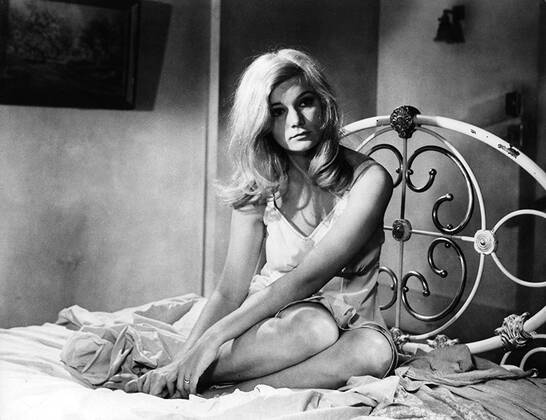
The film is really owned by Page and Hiller as the spinster sisters. Page got some criticism from some for her mannered performance but her over-the-top and over-aged Southern Belle is appropriate for the role of a woman who is basically adopting such a theatrical persona to conceal her unhealthy inner needs and obsessions even from herself, as becomes clear by the film's end. In fact Page had previously played similarly conflicted characters in the Williams play and film "Sweet Bird Of Youth" opposite Paul Newman for which she received a Tony nomination and she is well cast here. Wendy Hiller is also very good as the worried older sister given the thankless role of being the plain, responsible one who is the only one who knows and keeps the family secrets. She does not have the flashy scene stealing of Page but at the end when she takes charge and confronts Page she reveals her inner strength. Gene Tierney is fine in a supporting role that is underwritten and gives her little to do. Yvette has the opposite problem, her character has more importance to the film and yet she is under-written with unclear motivations. She has zero chemistry with Dean Martin, who to be fair is twenty five years her senior and old enough to be her father, and it's not obvious why she would be so slavishly devoted to him as while he is not knowingly cruel to her he is distant and aloof and her character is frankly too naive to be believable. In fact I would be tempted to call her a male fantasy of a beautiful and submissive child-bride if it weren't for the fact that the writer Lillian Helman was a woman, and a famously left-wing one at that.
In fact for a film and play that was considered scandalous it has a curious pulling of it's thematic punches the blame for which must be shared by both writer Hellman and screenwriter James Poe (who adapted the play) and director George Roy Hill. The film has the odd distinction of both having a complicated plot with plenty of conflicted characters with hidden secrets and motives and yet still being underwritten and rushed. The motivations of Julian, Lily and Charlotte are not fleshed out which in the case of Gene Tiereny's Charlotte (who is potentially full of scandals) is a waste of a charismatic actress. It's also possible that director George Roy Hill was not comfortable with the salacious subject matter as is certainly unlike his other well made but breezy films. He does an excellent job with the opening which is an extended tracking shot showing a pensive Yvette walking the streets of New Orleans, an inherently interesting city. She is gorgeous in the bedroom scene pouting in bed with the metal bed posts making her seem caged in while she watches cartoons making her seem childlike and implying scandals to come. Likewise the Berniers mansion is suitably musty and down-at-heel. But the movie never really delivers on this promise, becoming more of a competent showcase for the sisters who are the only fleshed out characters. The film was not a success getting only middling reviews with critic Bosley Crowther snidely dismissing it as "Bats In The Belfry" and it lost over a million dollars.The critical beatdown focussed on Dean Martin and deeply hurt him as had yearned to be taken seriously as a dramatic actor as his Rat Pack crony Frank Sinatra had been and he essentially gave up trying and retreated to the safe ground of playing lazy comic lotharios in trash like the Matt Helm series for the rest of his life. Yet viewing the film today I think the critics were too harsh, with its flaws it is a well made and intelligent film with fine performances from Page and Hiller and gorgeous lush black and white cinematography. The performances from Dean Martin, Tierney and Yvette may lack focus (again with the latter two not really thier fault) but they still possess enough screen presence to be watchable.
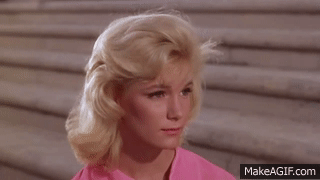
The lack of focus of Yvette's character are not her fault but this film does show the limitations of Yvette's reserved acting ability and her lack of comfort with her sex symbol status as would become more apparent as time went on. While Yvette obviously had great natural beauty she is essentially too distant and passive at this point to be relatable. In retrospect in her previous roles she was essentially charming eye candy, delectable to watch but leaving no after taste. Although in this film she is instantly presented as the kind of salacious jailbait as contemporary teen sex kitten Sue Lyon in "Lolita" as she lounges in bed wearing a flimsy nightie while watching cartoons. However she is much more restrained and uncomfortable than Lyon's gleefully winking jailbait. Yvette was an oddly sexless sex object. Her seeming reluctance to embrace her sexuality (at least in this way at this point) may reflect her own growing discomfort and even disdain for her ingenue persona with quotes like;
"I suppose I have a soulful quality. I was often cast as a wounded person, the sensitive one".
And; "The women they (male screenwriters) write are one-dimensional. They have no complexity in their lives. It's all surface. There's nothing to play. They're either sex objects or vanilla pudding."
Yvette was in fact a quite different person that most of the her sister sex symbols being a thoughtful, quiet, aloof woman who had ambitions to be writer, producer and artist, which she would later pursue, and she led a normal, long and happy scandal-free life away from the tabloids unlike the cursed likes of Marilyn, Sue Lyon or Inger Stevens.
There were a few more ingenue roles in big budget romance including a remake of the Rudolph Valentino classic "Four Horsemen Of The Apocalypse" (1961, directed by Vincente Minnelli), "Light In The Piazza" (1962 w/George Hamilton & Olivia De Havilland), "Diamondhead (1962) a melodrama with Charlton Heston and "Joy In The Morning" (1965 w/Richard Chamberlain). All were expensive flops and while Yvette didn't get bad reviews for her performances her contract with MGM wasn't renewed. In a way this may not have been an entirely bad thing for her. MGM clearly had set on presenting her purely as a dreamy ingenue, a role she had come to dislike and one which audiences seemed to tire of as well. Over the next few years she drifted through various genre pictures; a Western, War Films, a crime film, a Disney film. In these films she was required to be nothing more than eye candy in supporting roles that could have been played by any number of other actresses and were mostly forgettable, however there were a few oddities.
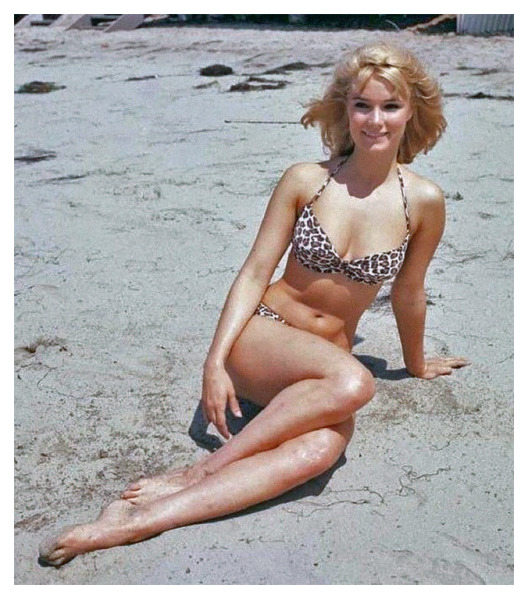
"Three In An Attic" (1968) was a change from her previous innocent ingenues. Instead this was a clumsy attempt of a swinging sixties sex romp. Starring Christopher Jones as a phillandering college student who cheats on his girlfriend (Yvette) with two other women and gets caught so the women team up to punish him by locking him in the attic of their dorm and exhaust him by sujecting him to constant sex until he learns his lesson. It is of course an absurd male fantasy with an attempt to make it hip with much pretentious hippie philosophizing, some would be psychedelic camera shorts and an admittedly cool sixties soundtrack. Yvette is likable and tries her best to be by turns girlishly innocent and coolly cynical but the movie is too silly for her. She is also a little too old to be taken for a college sophomore who is instantly smitten with the smarmy Jones the second he recites Kirkegarde. Especially since Jones is meanwhile an arrogant, unlikeable, jerk. The other two women are walking talking sixties cliches with a Black girl speaking in exaggerated Black Panther slogans with a "Get Christy Love" accent while the other is a dippy middle-class Jewish hippie. Neither are likable or believable for even a minute. Coincidentally also along for the ride is Nan Martin who played the other woman in "Toys In The Attic" and who does a fine Anne Bancroft impression. I actually thought she was Anne Bancroft until I double checked the credits.The movie (made for low-budget AIP Studios) was actually quite successful at the time but it's combination of cliched sixties catch-phrases and it's obvious sexism means it has not dated well except as a relic of the era. The film may have been trash but being in a sex comedy, even a bad one, meant that Yvette was truly looking to shake off her image as the whispy innocent dream girl. She followed that up with another swinging sixties flick, albeit a more intellectual art film "Picasso Summer" (1969) with Albert Finney.
A quite different late sixties relic was "The Delta Factor" a Mickey Spillane would-be thriller starring Christopher George, Diane McBain ("Spinout" w/Elvis Presley) and Yvonne De Carlo (AKA Morticia Adams) in which she played a secret agent involved in a scheme to bust a scientist out of a Caribbean prison. Because it's a low budget quickie it's not very good with lackluster action and an intrusive boom mic which gets almost as much screen time as she does. And because it's Spillane, her character is really just arm candy for the male agent who does all the action while she lounges about in a bikini and complains. Spillane later said he would have prefered that her role had been played by Daine McBain who would have been a more traditional world weary gun moll and he may be right although either way this would still be a forgettable film. Yvette was however still trying to move away from her innocent girl persona.
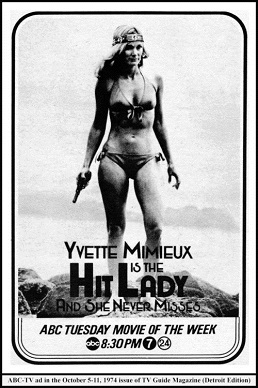
At this point Yvette was in her thirties, her trim dancer's body and finely sculpted face beautiful still but now too old to be playing ingenue roles. She had busied herself studying African and Haitian art and archeology and recoded an album reading the poetry of Charles Beaudelaire to a musical backing. Having grown out of her willowy adolescent phase she instead projected a cool sharp eyed intelligence probably closer to her actual personality by that point. Around this time she sued her agent for not getting her any decent roles and she had taken up writing both non fiction articles as well as short stories and scripts in search of a stronger role for herself. Taking after Spillane one of the stories she wrote was for a top flight female assassin in a made for TV film which she also produced called "Hit Lady" which had a conflicted character and a Hitchcockian twist ending. At only a hour long this film could have been perhaps been fleshed out for for feature length is she had gotten the financing to do so but however much Yvette enjoyed playing a role traditionally played by a man she herself is not intense or intimidating enough to be playing a murderer. She clearly relished the role however and soon took another spy role for a TV series "Deadly Game" (1971) in a role that was actually originally supposed to go to Inger Stevens before her suicide. If this show had been done in the swinging sixties era of "The Man From UNCLE", "The Avengers", "The Saint" and "I Spy" in a slightly campy style it might have had greater success but it only lasted one season and has been forgotten. In 1975 came "The Legend Of Valentino", a fact-free made-for TV bio pic in which she played a coldy hateable version of Valentino's wife Natacha Rambova (a person I wrote about here). The real Natacha was a beautiful, intelligent, talented, ambitious, strong-willed career woman who battled with male studio heads and reporters who spread malicious gossip potraying her as a ball-busting lesbian. This film takes that image and shows her as a cold, manipulative, gold-digger who uses Valentino for his money and connections then dumps him. Yvette did not write the script or produce this film (produced by Aaron Spelling) but as an intelligant career who had fought to get her own projects made she should have known better and turned this script down.
Besides these attempts to create a new tough girl persona she worked in more genre films in the seventies. Including a final ingenue role in a version of "Death Takes A Holiday" with Myrna Loy and Melvyn Douglas which got some decent reviews but is pretty dull to watch today. This being the seventies there were plenty of genre pictures; there was "Dark Of the Sun" an action film about mercenaries in Africa, "Journey Into Fear", another low budget spy thriller with Sam Waterson, Zero Mostell and Ian McShane in which she played a love interest with an awkward French accent. "Devildog The Hound From Hell", was a silly horror film and "Skyjacked" with Charlton Heston (again) and James Brolin was one of the many airplane in distress films of the era while "Disaster On Coastliner" (1979) was basically the same thing except this time on a train with Lloyd Bridges, William Shatner, EG Marshall, Raymond Burr, Lane Smith and Pat Hingle. These films varied in quality but at best they were competent but forgettable as were Yvette's stock characters which gave her little to do and which could have been played by any number of other actresses. Among these undistinguished genre films would be a better remembered Roger Corman grindhouse film "Jackson County Jail" in 1976.
"JACKSON COUNTY JAIL" (1976);
CAST;
YVETTE MIMIEUX ~ Dinah Hunter
TOMMY LEE JONES ~ Coley Blake
SEVEREN DARDEN ~ Sheriff Dempsey
HOWARD HESSEMAN ~ David
ROBERT CARRADINE ~ Bobby Ray
NAN MARTIN ~ Alison
MARY WORONOW ~ Pearl
Plot; Yvette stars as a prim career woman working as an ad executive in Hollywood who quits her job and dumps her no-good cheating boyfriend and decides to drive to New York and a new life. Along the way she stops off in a small Texas town where she meets every cruel Southern White Trash stereotype, a gum smacking waitress who rips her off, a pair of hitch-hikers who carjack her, a sleazy diner owner who tries to rape her, a dumb cop who arrest her on trumped up charges, a petty outlaw and another sleazy dumb cop who succeeds in raping her. This results in her killing the deputy and going on the run with petty hood played by a young Tommy Lee Jones. Sharp eyed viewers will enjoy that besides Jones the film also stars an even younger Robert Carradine as one of the carjackers, Howard Hessemen (soon to be famous as Johnny Fever on the classic TV sitcom "WKRP In Cincinnati" and who also died ten days after Yvette aged 81), Mary Woronow (from various Andy Warhol movies and the Ramones cult classic "Rock & Roll Highschool") as another outlaw and Betty Thomas (Hill Street Blues") as the waitress. Also along yet again is Nan Martin who must have been an old friend at this point.

Although this is in most ways typical trashy grindhouse fare it is more challenging with a brutal rape scene (including partial nudity) that is harsher than anything Yvette had done before (or subsequently) followed with scenes requiring her to be believably stressed and hysterical including beating her tormenter to death. If she was looking to completely banish her old ingenue image once and for all this certainly did it. The film also has some fairly thoughtful dialogue with Tommy Lee Jones who does a good job here. No less of a Grindhouse aficionado than Quentin Tarrentino has proclaimed himself a fan of this film.
Of the movies she made in the seventies the ones that got the most attention and are the best remembered were ironically two sci-fi epics that essentially returned her to her early days.
"THE NEPTUNE FACTOR" (1974)
CAST;
BEN GAZZARA ~ Commander Adrian Blake
YVETTE MIMIUEX ~ Dr. Leah Jansen
ERNEST BORGNINE ~ Chief Diver Don MacKay
WALTER PIGEON ~ Dr. Samuel Andrews
DONNELLY RHODES ~ Diver Bob Cousins
CHRIS WIGGANS ~ Captain Williams
At first glance this would appear to be another seventies disaster film as a deep sea lab is caught in an undersea earthquake and dropped into a chasm. Thereafter a small deep-sea sub is sent to find them with Yvette playing a scientist and crew member. This film is in many ways a throwback to the kind of big-budget non-space sci-fi movies of the late fifties, early sixties technicolour films including "The Time Machine" along with "20,000 Leagues Under The Sea" and "Journey To The Center Of The Earth" with gorgeous underwater sets and photography and special effects using miniatures and actual colourful tropical fish blown up to giant size. It's highly unlikely such fish would live at such depths, especially in giant size but what the Hell, they look pretty. The actual humans are fairly two dimensional stock characters as noted by critics at the time who noted the photography and effects and praised the film's look but considered the rest of the film predictable and dull with the human actors being essentially faceless. Her character however at least was a head scientist and an equal to the male characters and certainly not a fragile damsel in distress or eye candy. The film was modestly successful at box office making a modest profit plus overseas, television and later home video (then a new thing) also factored in.
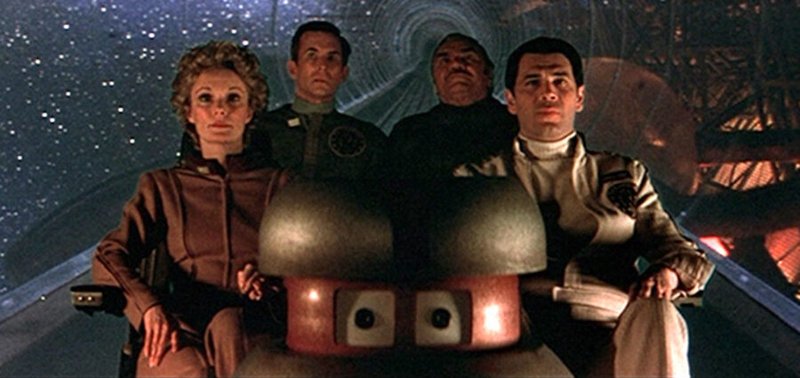
The other sci-fi epic was "The Black Hole", a big budget production from Disney Studios as they attempted to make an entry into the epic space opera genre in the aftermath of "Star Wars". The plot featured a spacecraft in the process of exploring remote space discovering a giant lost craft helmed by a mad scientist (Maximillian Schell) who has been studying a black hole and now intends to sail his craft through it. He is served by an army of robots including the hulking and menacing Maximillian. The massive ship, which looks like a combination flying shopping mall, planetarium, greenhouse, geodesic dome and an erector set still looks impressive. The robots are less so looking either stiff and crude or cutesy, this is a Disney film after all, but the film does have a stately quality with a psychedelic ending influenced by "2001 A Space Odyssey" that still works today in the CGI era. As with "The Neptune Factor" there is a solid cast including Schell, Ernest Borgnine (again), Anthony Perkins, Robert Forster, Joseph Bottoms and the voices of Roddy McDowell and Slim Pickens as robots. Yvette once again plays a briskly professional scientist (with an uncharacteristically unflattering hairdo) and once again is basically an equal member of the team and not a cringing female stereotype even if she doesn't really have much to do. This film is not as well remembered as the "Star Wars" and "Star Trek" franchises of the era (or "Tron", Disney's other sci-fi flim) but it is clearly superior to the big budget bubble-gum space fare of the time like "Battlestar Galactica" and "Buck Rogers" and maintains a loyal following. These films are not remembered for their human casts however and did not lead to any greater roles for Yvette.
"THE BLACK HOLE" (1979 Trailer);
Continuing on with one more attempts to adopt an adult sexual image Yvette made "Obsessive Love" in 1984, another made for TV she wrote and produced herself. This time she plays against type as a mousy, neurotic office worker who is stalking a soap opera star (Simon McCorkindale) who she tries to trap into an affair and marriage. This is ground later covered, albeit in a more violent way, by Stephen King in "Misery" with the crucial difference that Kathy Bates, was a pathetic but grotesque figure being older, plain and over-weight while Yvette was a pretty thirty something blonde. Not normally the type of person normally portrayed as a stalker, a fact Yvette herself noted;
"There are few enough films going these days," she said, "and there are three or four women who are offered all the good parts. Of course I could play a lot of awful parts that are too depressing to contemplate.... [Television is] not the love affair I have with film, but television can be a playground for interesting ideas. I love wild, baroque, slightly excessive theatrical ideas, and because television needs so much material, there's a chance to get some of those odd ideas done."
She does a fine job here and she was quite proud of this film as she had been of "Hit Lady" but if she was expecting these films to lead to offers of more parts for a take-charge leading lady she would be disappointed and it's worth noting that both these films were made-for-TV films done with small budgets. No Hollywood studio was interested in her as lead any more.

She spent the bulk of her remaining career switching to TV playing more icily confident but bland professional women in "Berrengers", a prime time soap of the "Dallas" type and a supporting role in "Lady Boss", a Jackie Collins mini-series in 1992. After that Yvette, then aged fifty (but still looking several years younger) and facing the prospect of a future playing matronly roles decided it wasn't worth the trouble and simply walked away. She devoted herself to a new business designing and selling art based on Haitian themes and real estate into her comfortable retirement.
Yvette Mimieux started out as other-worldly beautiful eye candy but unlike other ingenues she never seemed comfortable with that persona after a few years and spent the rest of her career trying to forge a more intelligent adult persona sometimes as a sex symbol and sometimes as a professional career woman with occasional success. Her best known movies would turn out to be the her first few ingenue roles and her last couple sci-fi epics with a grindhouse entry tossed in. She may never have been quite able to do everything she wanted to do but she was able to have thirty year career mostly on her own terms and quit on her own terms. She lived a long, stable and by all appearances happy life without any scandals or tragedies and if she had any serious regrets about lost opportunities she never shared them.
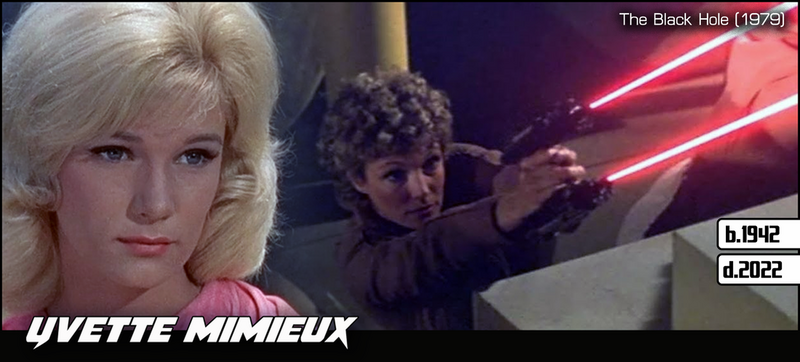

No comments:
Post a Comment